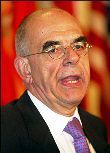Sudan obliged to ask for help in Darfur: UN’s Pronk
By Opheera McDoom
 KHARTOUM, Sept 23 (Reuters) – Sudan is obliged to ask for international support if it cannot protect the nearly 1.5 million people displaced by fighting in its remote Darfur region, the top U.N. envoy in Sudan said on Thursday.
KHARTOUM, Sept 23 (Reuters) – Sudan is obliged to ask for international support if it cannot protect the nearly 1.5 million people displaced by fighting in its remote Darfur region, the top U.N. envoy in Sudan said on Thursday.
“If you cannot do it (protect your population) … then you have to ask international support. It’s an obligation,” Jan Pronk told reporters in Khartoum.
“Are you serious, are you sincere in requesting adequately international support? Not grudgingly, not with delays … but (wholeheartedly) come and help us to protect our own people.”
A U.N. Security Council resolution adopted on Saturday threatened Sudan with possible oil sanctions if it did not stop the violence in Darfur, which the United States has dubbed genocide and the United Nations has called one of the world’s worst humanitarian crises.
It also called for more African Union observers to monitor a shaky ceasefire signed in April by the government and two rebel groups to end fighting that began in February 2003.
The U.N. was using a figure of fewer than 5,000 AU military observers in discussions with the pan-African body to support about 150 observers and 300 AU monitor-protection troops already on the ground, Pronk said.
Two rebel groups took up arms 19 months ago in Darfur, accusing Khartoum of neglect and supporting Arab militias to loot and burn African villages in a campaign of ethnic cleansing. The government denies the charge and calls the Janjaweed militias outlaws.
More than 1.2 million people have been displaced within Sudan and 200,000 refugees have fled to Chad. An estimated 50,000 people have been killed by violence, famine and disease.
Pronk said he has heard reports of people repopulating land left by the mostly African farmers who fled the Janjaweed.
“I do hear reports … in a number of villages there are other people now living (in those villages) … and that cannot be,” he said, adding he was encouraged, however, by the government’s continued call for people to return to their homes.
Pronk said he had visited the rebels in their headquarters in Eritrea a few days ago where he put pressure on them to allow more aid access to their areas and to resume political talks.
AU-sponsored peace talks in Nigeria broke down last week with the Sudanese government saying a U.S. declaration of genocide in Darfur and the U.N. resolution threatening sanctions hardened the rebel position to the point of intransigence.
While appealing for rebel cooperation, he said they had a valid claim that Darfur had been marginalised, blaming government policy over the past two decades.
“The policy here, the development and economic policies in the country have led to the marginalisation of many people and the rebels are quite sincere in making that a priority,” he said.
Pronk attributed a recent rise in the number of attacks on food and aid convoys in Darfur to bandits, adding he did not blame the rebels or the government.
